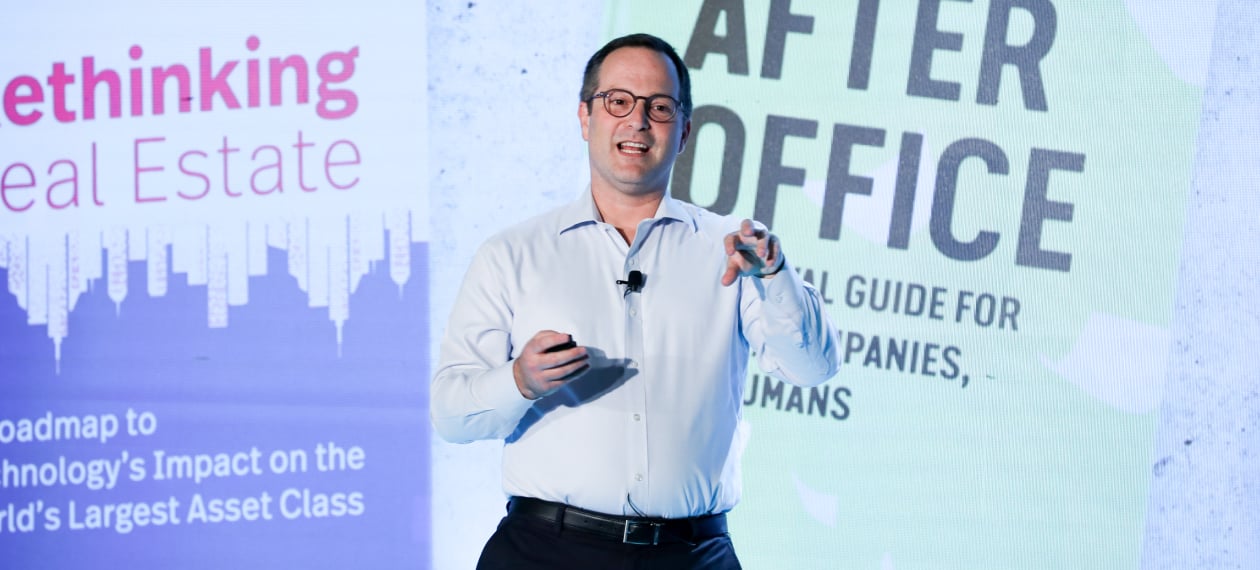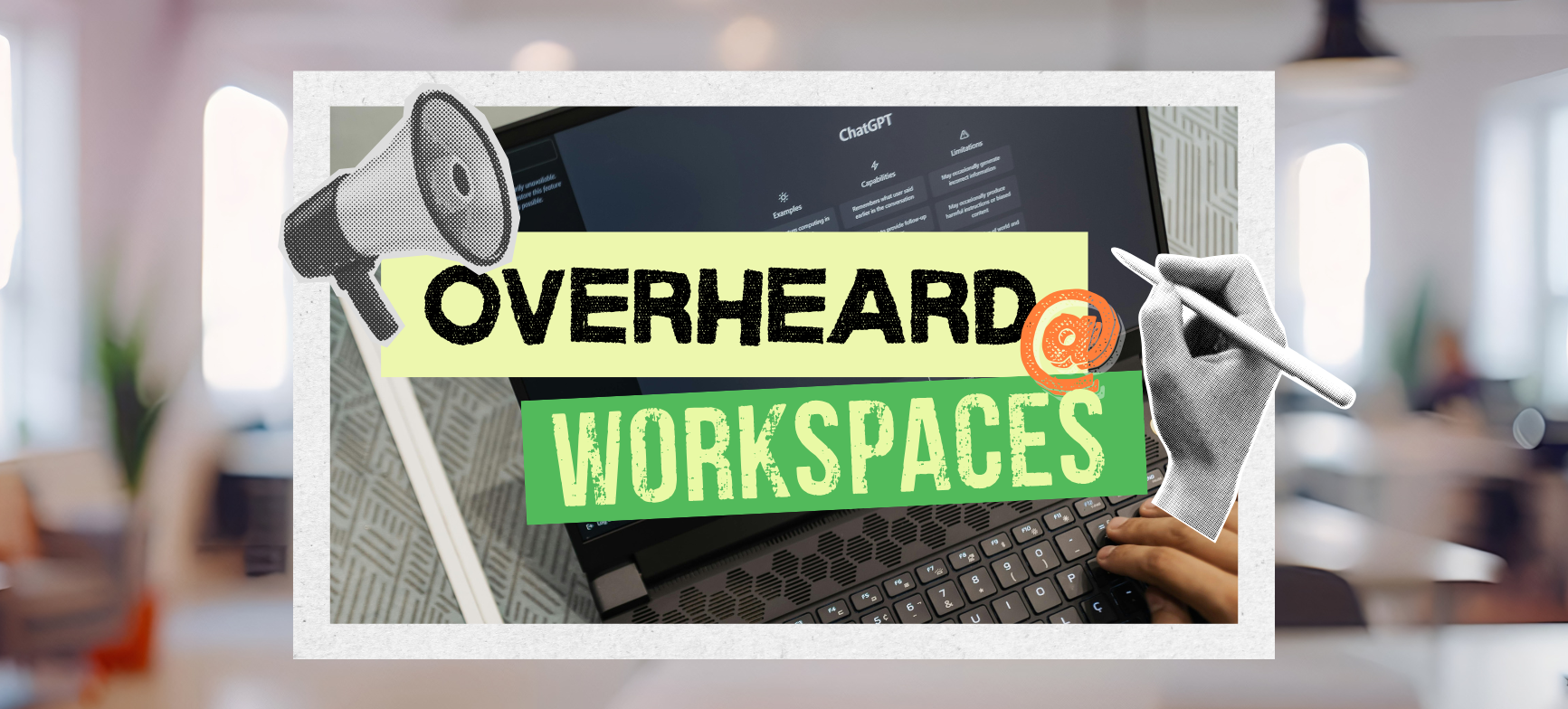I got the chance to sit down with author and future of work expert Dror Poleg to pick his brain at WorkSpaces ‘23. Below are the moments that really caught my attention… and even made my jaw drop.
About an hour after interviewing Poleg, an attendee came up to me and asked me how I was doing, whether I’d “recovered yet.”
“What do you mean?” I asked, puzzled.
“I was a little worried. It looked like you were having a meltdown up there,” she joked.
But I guess I was, at least a little. Hearing Dror’s musings on the future (or reading them) can be somewhat… disorienting. “Well, this has been equal parts depressing and weird,” I told him at some point toward the end of the Q&A.
“Could all of that really happen?” I remember thinking afterward, and I wasn’t the only one. Here’s some feedback from an attendee:
“Very engaging talk by Dror Poleg discussing how the arrival of AI may influence work in the future. It was the talk of almost every table at lunch, really thought-provoking.”
And when it comes to Poleg, it’s important to know he has a pretty solid track record of predicting what’s to come. His 2019 book, Rethinking Real Estate foresaw much of the disruption that would emerge when Covid hit less than a year later.
Anyway, here are six things Poleg mentioned that I think are worth paying attention to if you’re in corporate real estate, or if you’re just interested in what an AI-powered future could look like. Wanna watch the whole thing? You can do that here.
AI will lead to the creation of even more “bullshit jobs”
Where does Poleg’s imagination take him when he thinks about the impact of AI on work and society?
“I think it takes me to a world that’s much less equal,” he replied, “Where fewer people do more of the work that gets more of the money, and more people are doing other stuff that is just… less important or less valued.”
I know. Bleak. But Poleg also added we’ve been creating bullshit jobs for close to 100 years already. So we’re already pretty good at it; AI will just make us better at it, or stimulate a greater need for more meaningless, pointless positions.
Our fears about certain major US cities could be completely warranted. Others, not so much
Ever since the pandemic, we’ve been wondering what the future holds for the world’s biggest metropolises. Will they bounce back? What will happen to San Francisco? What about all of those vacant office buildings in New York?
Dror had both good and bad news for us.
Corporate Real Estate must think long and hard about why it exists
For years, corporate real estate was a process of cramming as many people as possible into a physical space. It was a line item on an organization’s fiscal budget… an area of the business that reported to finance.
Of all the industries we produce content in, this is the industry that has seen the most dramatic change since the pandemic. Undeniably, the role of the corporate real estate and workplace professional is changing. According to Poleg, executives need to be asking themselves questions that they may never have thought of before:
“How do I enable every individual… to make the most out of their potential, to collaborate with each other, and to be happy and stay with this company because they’re excited about what they do?”
Flexible work is making regional cities more popular. It’s the same with major centers. So how should that affect your portfolio strategy?
As people everywhere began relocating in the middle of lockdowns, corporations faced an uncertainty they had never encountered before.
The ongoing redistribution of the workforce means that making long-term portfolio decisions remains a difficult task. Which cities require leased space that may not have been part of your strategy previously? Where does it make more sense to rely on coworking providers instead?
We haven’t even begun to scratch the surface when it comes to AI’s impact on CRE
Attempting to understand AI’s role in shaping entire industries is one thing, but more complex is wrapping our heads around what it will look like to work with these tools personally... especially when they continue to evolve at such a rapid clip.
What’s one tangible way that artificial intelligence is going to change or enhance what you do as a corporate real estate executive?
Companies that don’t embrace flexibility will eventually fail
Poleg defines the “non-linear” economy as one that’s more creative, specialized, uncertain, amorphous, and unequal. See him explain this in more detail here. To exist in this reality, he said, organizations must adopt a flexible mindset.
Something our WorkSpaces community is familiar with and has spoken about candidly among peers is an unwillingness from leadership to embrace flexibility. One of the reasons that many organizations are reluctant to radically adapt, Poleg explained to a room of laughter, is because we’re all still “struggling with the five stages of office grief.” But companies and/or individuals that fail to drop old ways of thinking and change their relationship with the office and physical space, he said, will simply fall away.

Posted by
Join us at WorkSpaces!
The retreat for corporate real estate and workplace innovators.
Oct 4-6, 2026 | Santa Barbara, CA




-3.png)
-3.png)


-2.png)

Comments